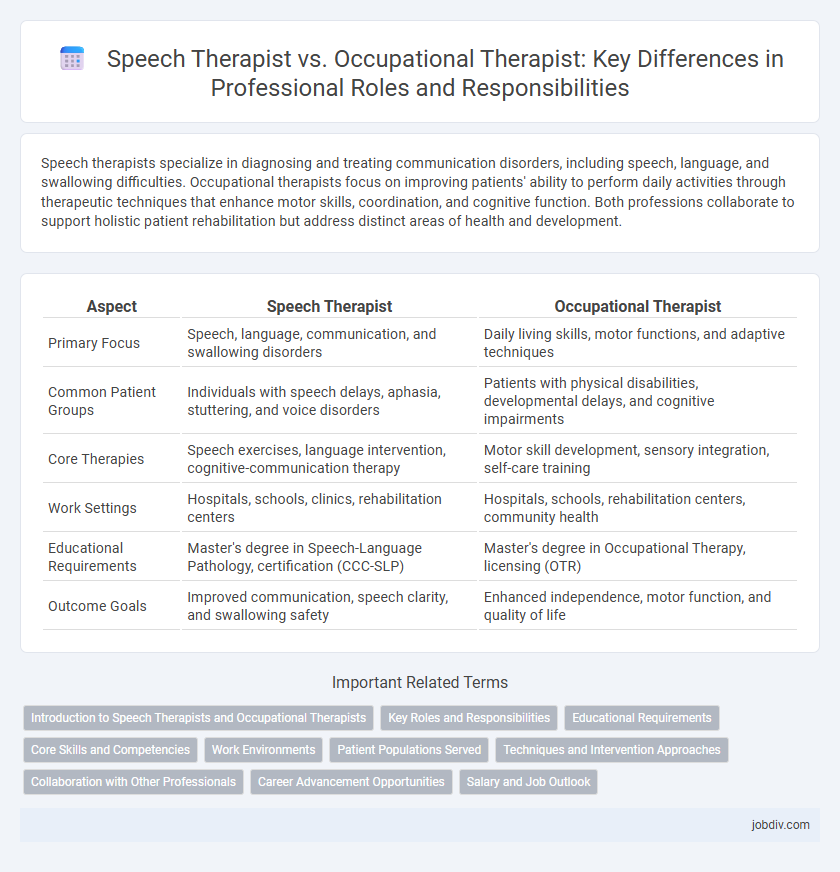Speech therapists specialize in diagnosing and treating communication disorders, including speech, language, and swallowing difficulties. Occupational therapists focus on improving patients' ability to perform daily activities through therapeutic techniques that enhance motor skills, coordination, and cognitive function. Both professions collaborate to support holistic patient rehabilitation but address distinct areas of health and development.
Table of Comparison
| Aspect | Speech Therapist | Occupational Therapist |
|---|---|---|
| Primary Focus | Speech, language, communication, and swallowing disorders | Daily living skills, motor functions, and adaptive techniques |
| Common Patient Groups | Individuals with speech delays, aphasia, stuttering, and voice disorders | Patients with physical disabilities, developmental delays, and cognitive impairments |
| Core Therapies | Speech exercises, language intervention, cognitive-communication therapy | Motor skill development, sensory integration, self-care training |
| Work Settings | Hospitals, schools, clinics, rehabilitation centers | Hospitals, schools, rehabilitation centers, community health |
| Educational Requirements | Master's degree in Speech-Language Pathology, certification (CCC-SLP) | Master's degree in Occupational Therapy, licensing (OTR) |
| Outcome Goals | Improved communication, speech clarity, and swallowing safety | Enhanced independence, motor function, and quality of life |
Introduction to Speech Therapists and Occupational Therapists
Speech therapists specialize in diagnosing and treating communication disorders, including speech, language, voice, and fluency challenges across all age groups. Occupational therapists focus on enhancing patients' ability to perform daily activities through customized interventions addressing physical, cognitive, and sensory impairments. Both professions collaborate to improve patients' quality of life by targeting different but often complementary aspects of functional health.
Key Roles and Responsibilities
Speech therapists specialize in diagnosing and treating communication disorders, including speech, language, and swallowing difficulties, using tailored therapy techniques to improve patients' verbal and non-verbal communication skills. Occupational therapists focus on enhancing patients' ability to perform daily activities by developing fine motor skills, cognitive functions, and adaptive techniques to foster independence in personal and professional environments. Both professions employ individualized intervention plans but differ primarily in targeting communication versus functional daily living skills.
Educational Requirements
Speech therapists typically require a master's degree in speech-language pathology and must obtain state licensure and national certification from the American Speech-Language-Hearing Association (ASHA). Occupational therapists need a master's or doctoral degree in occupational therapy, complete supervised fieldwork, and pass the National Board for Certification in Occupational Therapy (NBCOT) exam for licensure. Both professions demand rigorous clinical training and continuing education to maintain certification and licensure.
Core Skills and Competencies
Speech therapists specialize in diagnosing and treating communication disorders, focusing on speech, language, cognitive-communication, and swallowing difficulties. Occupational therapists develop skills to improve daily living and work activities, emphasizing fine motor skills, sensory integration, and adaptive techniques. Both professionals demonstrate strong assessment, patient-centered care, and interdisciplinary collaboration competencies to optimize rehabilitation outcomes.
Work Environments
Speech therapists primarily work in settings such as hospitals, schools, rehabilitation centers, and private clinics where they address communication and swallowing disorders. Occupational therapists operate in diverse environments including hospitals, nursing homes, schools, mental health facilities, and patients' homes, focusing on improving daily living and work skills. Both professions often collaborate in multidisciplinary teams to provide comprehensive patient care in clinical and community settings.
Patient Populations Served
Speech therapists primarily serve patients with communication disorders, speech delays, and swallowing difficulties across all age groups, including children with autism and stroke survivors. Occupational therapists focus on individuals with physical, cognitive, or developmental challenges, such as those recovering from injury, elderly patients with mobility issues, and children with sensory processing disorders. Both professions collaborate to improve patients' functional abilities and quality of life but target different aspects of rehabilitation and support.
Techniques and Intervention Approaches
Speech therapists employ techniques such as articulation therapy, language intervention activities, and cognitive-communication therapy to improve speech, language, and swallowing disorders. Occupational therapists utilize interventions including sensory integration, fine motor skill training, and adaptive equipment to enhance daily living and functional abilities. Both professionals collaborate through customized treatment plans that address specific patient needs using evidence-based practices.
Collaboration with Other Professionals
Speech therapists and occupational therapists collaborate closely with educators, physicians, and psychologists to create comprehensive treatment plans tailored to individual patient needs. Their interdisciplinary approach enhances patient outcomes by addressing communication, motor skills, and cognitive challenges simultaneously. Effective collaboration ensures holistic care, improves therapy efficiency, and supports goal-oriented progress in diverse clinical and educational settings.
Career Advancement Opportunities
Speech therapists often advance through specialization in areas like pediatric, geriatric, or neurogenic speech disorders, enabling roles in clinical leadership or academic research. Occupational therapists expand career prospects by focusing on specialized populations such as mental health, pediatrics, or geriatrics, moving towards management positions or consultancy roles. Both professions offer avenues for higher education and certifications that significantly enhance career growth and salary potential.
Salary and Job Outlook
Speech therapists typically earn a median annual salary of $79,000, while occupational therapists have a higher median salary around $87,000, according to the U.S. Bureau of Labor Statistics. Employment for speech therapists is projected to grow 21% from 2022 to 2032, driven by increased demand for speech therapy services in schools and healthcare settings. Occupational therapy jobs are expected to grow 16% during the same period, reflecting rising needs in rehabilitation and elder care sectors.
Speech Therapist vs Occupational Therapist Infographic

 jobdiv.com
jobdiv.com